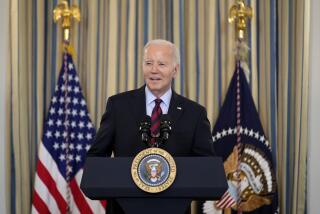Our Challenge Is to Do More With Less : Economy: The technology for a high quality of life using fewer resources is in place. What’s missing is the will to do so.
- Share via
People vote their pocketbooks. This is the most credible explanation of election results throughout the 20th Century. The election of George Bush may well turn on whether the current downturn will end by the time of the next presidential election, just 12 months away.
Given this reality, which is as well known to Republicans as it is to Democrats, we can be sure that the President’s team really did believe that prosperity in 1992 was a sure thing. They were persuaded by their own propaganda. And they have been caught short by the signs of weakness throughout the economy that threaten not only Bush’s reelection but also social solidarity.
Why hasn’t the economy responded to efforts made to stimulate it? There are many reasons that interlock and reinforce each other.
First, too much was built in the 1980s. We have too many homes, factories and malls. As a result, there are few profitable construction opportunities, nor are many expected throughout the 1990s.
Second, we bought too much on credit in the past decade. People feel threatened by their debts and are trying to pay them down, a trend reinforced by the fact that credit-card interest is no longer tax deductible. Many people are making do with what they have. For example, the average age of cars on the road has been rising dramatically.
Third, companies are recognizing that they can reduce their work force. America has taken far less advantage of modern technologies than Europe, and it is now discovering that it must catch up if it wants to stay competitive.
In addition, new understandings of decision-making are leading to drastic cuts in the layers of management, and massive displacement is the result.
The level of layoffs remains high; this trend will continue throughout the decade. The belief that there would be a general shortage of labor in the 1990s now seems improbable. The central trend will be a split between those with the skills to work in our increasingly technological world, who will do well, and those who are left out of the job market who will sink into a permanent underclass.
Fourth, income and wealth has moved to the richest 5% of the population, while the middle class and the poor have lost ground. More and more people who want to buy do not have the resources to do so. This is particularly true of people between the ages of 20 and 35, who have far fewer resources than those who were in the same age-group 10 years ago.
These four patterns would be enough, by themselves, to prevent a spirited recovery. There are, however, some deeper trends that reinforce the current economic weakness: People want more time to themselves and are even willing to reduce their incomes to get it; the priority placed on consumption is declining, and thrift and personal time are coming back into favor.
In addition, people are finally recognizing that there is a clash between economic growth and environmental balance. They are beginning to realize that ecological limits force us to choose between more wealth for the rich and progress for the very poor because of the inability of the environment to cope with our growing abuse of air, water and land.
America’s expectations developed in the boom years of the 1950s and 1960s; the belief that everybody should receive a steadily rising standard of living dominates the culture.
It is now certain that these two decades were a unique period that will never be repeated. The new challenge is to do more with less, to provide a high quality of life using fewer resources.
The technological knowledge for this task is already in place. The problem is that today’s generation of economists and politicians have so far refused to face the new challenges. This is the reason why so many Americans feel that the country is on the wrong track.
More to Read
Get the L.A. Times Politics newsletter
Deeply reported insights into legislation, politics and policy from Sacramento, Washington and beyond. In your inbox twice per week.
You may occasionally receive promotional content from the Los Angeles Times.










